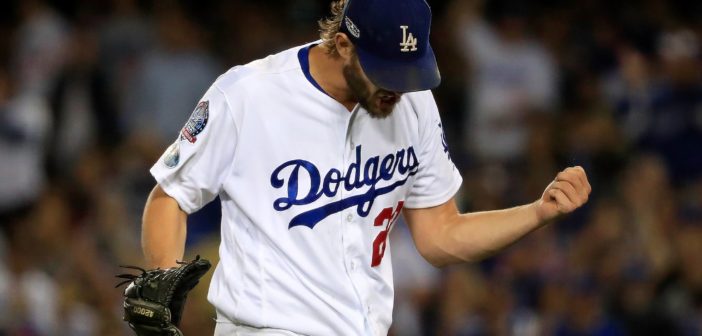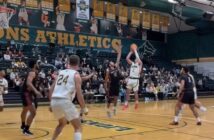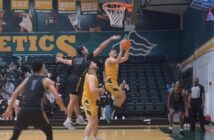By: William Burns
The NLDS and ALDS wrapped up on October 9th, on the 4thgame of a five-game series between the New York Yankees and the Boston Red Sox. And this was one of the longer series. With two teams getting sweeps, and two teams taking four games, the division series were wrapped up quick. These teams are not messing around and they all want a chance at the title.
The National League Division series featured a series between the Colorado Rockies and the Milwaukee Brewers, and the Atlanta Braves vs. the Los Angeles Dodgers. The Brewers completed their sweep of the Rockies on Oct. 7. After a grueling win in the 10th inning for a 3-2 win to open up the series on Oct. 4, the Brewers decided to quit messing around and soundly beat the Rockies 4-0 and 6-0, to advance to the NLCS to take on the winner of the Braves-Dodgers game. In game one, the “Brew Crew” had a two-run lead slip away from them, as the Rockies tied up the game at two apiece. This caused a 10th inning, when, with two outs, and two strikes against him, Mike Moustakas punched out a single and scored Christian Yelich, who incidentally, is the favorite for the National League MVP award. Yelich accounted for all three runs that game, hitting a two-run homer earlier in the contest and scoring the winning run. The Brewers went into game two riding a nine-game win streak and didn’t let off the gas one bit. A couple of back to back doubles in the fourth started the scoring for the day in a pitching duel, until they added three more insurance runs in the eighth inning. The Brewers cruised on to make it 10 straight wins and take a commanding 2-0 lead in the series. A series that had their name on it. Milwaukee went through game three much like the game before, with an easy win of 6-0. The Brewers outscored the Rockies 13-2 and are heading into the ALCS riding an 11-game win streak.
The Atlanta Braves put up a little more fight against the Dodgers than the Rockies did, but not by much. The Dodgers started the series off with two shut-outs. Outscoring the Braves 9-0, before Braves rookie Ronald Acuna hit a grand slam in game three to secure a win. The Braves then promptly dropped the next game the day after and went home with their season ended. Surprisingly enough, in game one, a 6-0 win for Los Angeles, Atlanta had more hits, six, to the Dodgers five, but just couldn’t string anything together to get the baserunners across the plate. In game two, Clayton Kershaw shut down the Braves, allowing just two hits over eight innings, en route to a 3-0 shutout win, where the Dodgers joined the 1921 New York Yankees team as the only teams to open up a postseason series with two straight shutouts. The Dodgers got complacent in game three, giving up five runs to the Braves in the second inning, including a record-setting grand slam. Acuna become the youngest player in history to hit a grand slam in the postseason. However, the Dodgers clawed back into the game with a two-run third inning, and a three-run fifth inning. Freddie Freeman provided the Braves with a go-ahead solo shot, his first career home run in the postseason. The score stayed 6-5 for the remainder of the game, and the Braves stayed alive. The Dodgers struck in the first inning of game four, scoring one run. Atlanta responded in the bottom of the fourth inning with a pair of runs, the only time they would score in the game. The Dodgers retook the lead in the top of the sixth with a couple of runs and added three more in the seventh. The game ended with a score of 6-2, and the Dodgers booked their ticket to the NLCS and a series with the red-hot Milwaukee Brewers.
In the ALDS the Houston Astros matched up with Cleveland Indians and produced an extremely one-sided series win. There were no shutouts, but the Astros were in control of every game right out the gate. Dallas owes a lot of their success to their phenomenal starting pitchers. With Justin Verlander, Gerrit Cole, and Dallas Keuchel, the Astros are ready to roll. They were the two seed, so they hosted the third-seeded Indians. The Astros took full advantage of the home turf and got the lead in the fourth inning and never gave it up. They routed Cleveland 7-2 and also outhit them 12-3. The Astros offense was fueled with four home runs from the high-powered offense. The second game in Houston, the Astros were down 1-0 until the bottom of the sixth inning when they put two runs on the board and added another one in the seventh for the final score of 3-1, with the Astros at nine hits and the Indians at three. Each team had a homer. Game three was in Cleveland, but Houston had no intention of waiting to end the series. The Astros had three home runs in 13 hits and compiled 11 runs to Cleveland’s three. The Indians defense struggled during the game with three errors. Houston put together three complete games, with both defense and offense, even compiling a decent number of home runs.
The longest series in the American League came between the New York Yankees and Boston Red Sox. Boston had home field advantage, so they hosted the first two games. In game one, Chris Sale was on the mound for Boston and J.A. Happ was on the mound for the Yankees. Happ and the Yankees pitching staff gave up three runs in the first inning, and two in the third inning before shutting down the Red Sox for the game. Chris Sale and the Red Sox held the Yankees scoreless till the sixth inning, when they started their comeback. However, they fell one run short and dropped the game 5-4. However, the Yankees left many runners on base, and outhit the Red Sox 10-8. Sluggers Aaron Judge and JD Martinez both had home runs. In game two the Yankees came out of gate with vengeance and chased starting pitcher David Price with three runs in the first inning, fueled by a Judge home run in the first, and a Gary Sanchez home run in the second. Boston tacked one on in the fourth, but Sanchez was not done as he sparked a three-run seventh inning with 479ft blast completely out of the stadium. The Yankees won the game 6-2 and returned to the Bronx after a split with Boston. Game three was nothing short of a nightmare for New York. With their supposed ace pitcher on the mound, they gave up 10 runs in the first four innings and it didn’t get any better from there. The final score was 16-1 in Boston’s favor, after outhitting the Yankees 18-5. This loss ended the seven-game home win streak for New York in the postseason. Game four was a little better. New York pitcher left-handed veteran C.C. Sabathia gave up three runs in the third inning but from there on out the bullpen only allowed one more run. Coming into the bottom of the ninth down 4-1, the Yankees needed a break, and they got it. With a walk, single, strikeout, walk, and a hit batter, the Yankees were down 4-2 with bases loaded and catcher Gary Sanchez up to bat. Sanchez hit a deep fly ball to left field in what was thought to be a walk-off grand slam, but the ball was caught on the warning track. The runner scored from third giving Sanchez the sacrifice fly and pulled the Yankees within one with two runners on, two outs, and rookie phenom Gleyber Torres up to bat. Torres grounded out to the third baseman softly who put the game away and secured Boston’s series with the Houston Astros.





